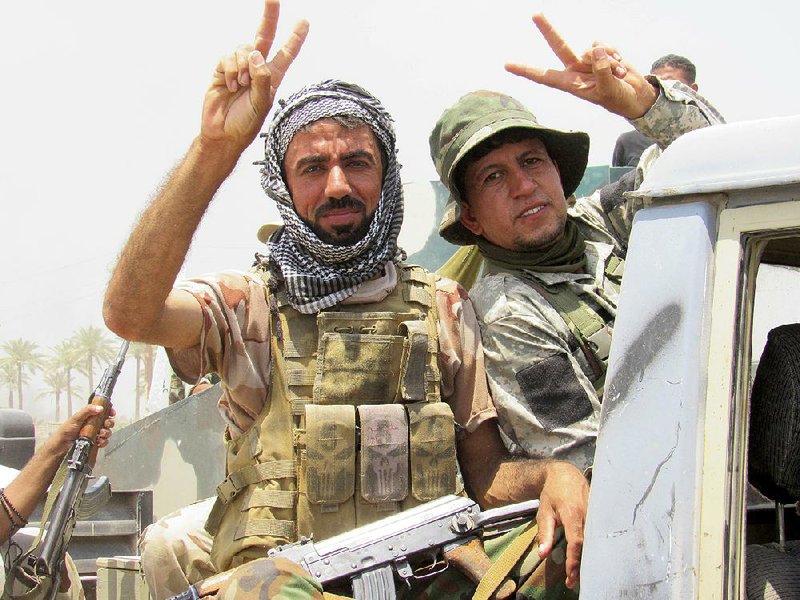BAGHDAD -- Iraq's prime minister hailed "big successes" Monday by government troops after starting an offensive to retake Fallujah from Islamic State militants, but U.S. and other Iraqi officials said the operation promises to be one of the toughest challenges yet for the country's security forces.
Troops recaptured some agricultural areas in Garma, a district along the northeastern edge of Fallujah, under intensified Iraqi airstrikes and heavy artillery, said Col. Mahmoud al-Mardhi, who leads Shiite militia forces in the operation.
The U.S.-led coalition carried out two airstrikes, the Pentagon said, part of an aerial campaign that has seen an average of two bombings a day over the past week in the city about 40 miles west of Baghdad.
Prime Minister Haider al-Abadi toured the Fallujah front line dressed in the all-black fatigues of Iraq's elite counterterrorism forces, saying the troops had achieved "more than what was planned for" and "big successes," but he did not elaborate.
He had triumphantly announced the start of the operation in a televised address late Sunday, flanked by senior military commanders. The city has been under the control of Islamic State militants since January 2014.
Originally planned to start more than two months ago, the offensive was delayed by political infighting and the deteriorating security situation in Baghdad, Abadi said.
Navy Capt. Jeff Davis, a Pentagon spokesman, said he does not believe the Iraqis have gotten into the city yet.
The latest estimates put the number of Islamic State fighters in all of Anbar province at about 1,000 and "dropping quickly," Davis said. The number of fighters in Fallujah also has been falling, he said, but he added that he did not have a firm number. One previous coalition estimate put it at 500-700 fighters.
The offensive comes after a series of territorial gains over the Islamic State in western Iraq, but it still could delay plans to win back Mosul, Iraq's second-largest city and the focus of the U.S. plan to defeat the militants in Iraq and neighboring Syria.
A number of other operations announced by Iraqi leaders have faltered. A plan to retake Mosul was announced in March with much fanfare, but only a handful of villages near the city have been captured since then.
The assault on Fallujah is the first major offensive in an urban area since Iraqi forces cleared Ramadi of Islamic State fighters earlier this year. Despite being declared a victory, Ramadi stands largely uninhabitable.
Once home to more than 250,000 people, only about 60,000 to 100,000 civilians remain in Fallujah, according to the coalition and the United Nations. Many Iraqis are suspicious of the civilians who have not fled, assuming many are Islamic State sympathizers.
But residents say that because the Islamic State controls the main roads, thousands are trapped. The U.N. reported only 80 families have fled in recent days.
U.N. Secretary-General Ban Ki-moon said there is "a great risk" to about 50,000 civilians estimated by the U.N. to still be in Fallujah.
"It's important that they have some safe corridors that they could use," U.N. spokesman Stephane Dujarric said.
The Islamic State previously has used civilians as human shields, forcing families to move with the fighters as they retreat from advancing forces and coalition airstrikes.
"The first stage of the operation is to surround [the city] and target the Daesh headquarters with bombing operations," said Lt. Gen. Abdul-Wahab al-Saadi, head of the counterterrorism forces in the operation. Daesh is the Arabic acronym for the militant group, which also is known by the acronym ISIL.
The forces are expected to be slowed down by explosives planted by the militants, al-Saadi said, adding, "I can't say how long the operation will take."
The disparate groups who make up Iraq's security forces have massed troops and equipment on the city's outskirts. Federal police, Shiite militia forces and Sunni tribal fighters are each holding their own front-line positions, and the elite counterterrorism troops say they have not yet begun their role.
Al-Saadi said that once his counterterrorism forces are in place, they will push to the city center, and the other armed groups will hold the perimeter.
After more than two years in firm control of Fallujah, Islamic State fighters are expected to have knitted their way into the civilian population on a greater scale than previously seen in Ramadi or Tikrit.
"Fallujah was the very first city to fall to ISIL more than two years ago, so the enemy has had two years to prepare their defenses and to establish themselves, which makes it a very challenging military objective," said Col. Steve Warren, spokesman for the U.S.-led coalition in Iraq.
Information for this article was contributed by Sinan Salaheddin, Salar Salim and Edith M. Lederer of The Associated Press.
A Section on 05/24/2016

